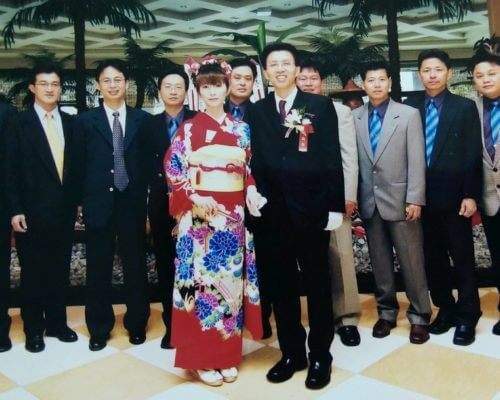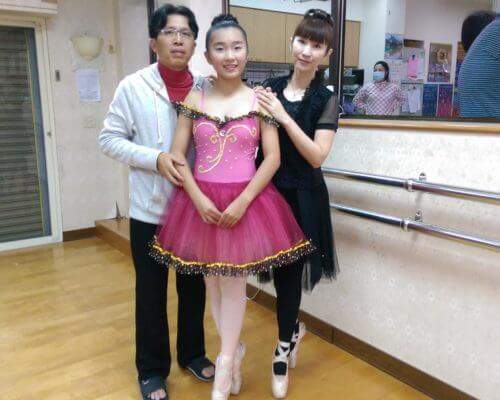“It’s really hard to live in Taitung!” says Miss Masako Morishita from Japan. By looking at the glass of tea on the table condensed into droplets as if sweat gradually fall from the surface, I broke out in a cold sweat from her words. “But now I really like Taitung!” she says with a ight smile. You could fully feel the unique gentle temperament of a Japanese woman from Masako Morishita.

Through the introduction of her classmate, she was acquainted with her now husband who lives in Chenggong. While they were still dating, they once traveled to Chenggong. At that time, she felt there was absolutely no way she would get married. However, she was impressed by his sincerity and efforts, so she decided to marry him him and start a family together in Taiwan. “I couldn’t get used to the life in Taiwan in the beginning. It was hard!” she says. Growing up in Osaka, Japan, the hustle-and-bustle of the city, and convenient lifestyle are a matter of course. When she moved away, she couldn’t find the taste of her hometown in Taitung, which caused anxiety for her while she was trying to adapt to her new environment. “There were no convenience stores in Chenggong fifteen years ago when we got marrried. The first stored opened on Zhonghua Rd, but you couldn’t find any goods from Japan for sure.” she says. Occasionally, she saw Onigiri being sold in-store, which made her think of her hometown. Instead of it making her happy, it still did not embody the hometown taste that she longed for. It brought her to tears. Fortunately, she was very fond of the fruits in Taitung and was constantly eating them. Finally, her nostalgia was solved owing to her husband who took her to Kaohsiung to purchase Japanese goods.
Initially, Masako couldn’t feel the joy of life in Taitung. Not being able to accustom herself to the local food, coupled with the language barrier, it was then when Masako’s husband encouraged her to teach classical ballet to the kids in Chenggong. Miraculously, it was her group of students that opened her heart. “In the beginning, there were problems, such as the language barrier and my closed mind. My husband would help me translate sentence by sentence, and that is how we started.” she recalls. What started with a reluctant mind gradually turned into a pleasant atmosphere with the children. The support and recognition from the kids and their parents made her feel better. Masako even held a classical ballet premiere every year for the students, which gave them a perfect stage to express their achievements. “That was the affirmation of the children. The shows were combined with the costumes, stage design, sound control etc. I was also very moved that all parents who took part in it were also very helpful!”
As if seeing the dawn, Masako even feels that the purpose of coming to Chenggong was to meet these kids. From this point of view, the hard work of adapting to Taitung over the past 10 years doesn’t seem to bother her anymore. “ I couldn’t really accept the people of Taiwan in the beginning, I couldn’t get used to their hospitality. But I’ve changed a lot.” In Japanese culture, visitors will first inform the host before they visit. However, it seems not to be the case in the warm countryside of Taitung. Neighbors will come by and chat whenever they want to. She struggled to adapt to their hospitality and enthusiasism for a long time.

Her understanding of Taiwanese hospitality began two years ago when the Japanese filmmaker, Atsuko Sakai, came to Chenggong to film and filmed Taiwan Bansai, a documentary about Taiwan. Atsuko would occasionally visit Masako, and shared with her some local stories. Gradually, she understood that the Taiwanese people’s personalities, ideas and enthusiasm are developed into its own characteristics. With this in-depth understanding of those local stories, Masako was for the first time really able to establish relationships with the locals. Her heart was no longer struggling and resisting as she began to enjoy her life in Taitung.
“When I go back to Japan, I sometimes bring back a special bag which is made in Taitung as a souvenir. My friends all really like it!” says Masako. There is a special bag mixed with blue, green, and red colors which is sold in the traditional markets in Taitung. To my curiosity, I checked it online and found out that is the hot sale in Taiwan called Ga Ji La in Taiwan currently. No one expected a common bag in Taiwan to actually become a popular souvenir in Japan.From her resistance to acceptance, it seems like destiny for Masako to have come to Chenggong, and to have the opportunity to meet a group of lovely children, and teach them how to do dance. Furthermore, in 2016, she also turned her love into real action which contributed to her language skills. She helped to promote the academic exchange of Sagakenritsu High School in Japan and National Chenggong Commercial and Aquaculture Senior Vocational High School. Her moves not only urged the children have more worldviews, but also showed them a broader sky to explore. “After all, I am here because of these kids!” Masako says with a confident and happy smile.




